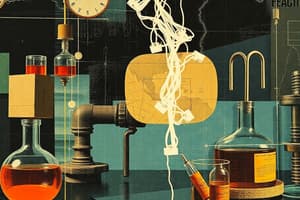Podcast
Questions and Answers
What did British scientist William Nicholson observe when passing an electric current through water?
What did British scientist William Nicholson observe when passing an electric current through water?
- Changes in the color of solutions
- Creation of a strong light source
- Deposition of metals on the electrodes
- Formation of oxygen and hydrogen bubbles (correct)
Which electrode, connected to which terminal, produced oxygen bubbles according to William Nicholson's observations?
Which electrode, connected to which terminal, produced oxygen bubbles according to William Nicholson's observations?
- Positive electrode, positive terminal
- Negative electrode, positive terminal
- Positive electrode, negative terminal (correct)
- Negative electrode, negative terminal
What is the result of passing an electric current through a copper sulfate solution?
What is the result of passing an electric current through a copper sulfate solution?
- Production of a loud noise
- Deposition of copper on the negative electrode (correct)
- Change in the pH level of the solution
- Formation of oxygen and hydrogen bubbles
In electroplating, what is the purpose of passing an electric current through a solution?
In electroplating, what is the purpose of passing an electric current through a solution?
How can one differentiate good conductors from poor conductors using an LED in a beaker filled with liquids?
How can one differentiate good conductors from poor conductors using an LED in a beaker filled with liquids?
Flashcards are hidden until you start studying
Study Notes
Exploring the Chemical Effects of Electric Current
The interaction of electricity and matter leads to a fascinating array of phenomena, including the chemical effects of electric current. When an electric current flows through a conducting solution, chemical reactions ensue, resulting in alterations in the substance's properties.
British scientist William Nicholson pioneered studies into this realm by observing the formation of oxygen and hydrogen bubbles upon passing an electric current through water. He noted that the electrode connected to the negative terminal produced hydrogen bubbles while the electrode attached to the positive terminal yielded oxygen bubbles.
Apart from generating gases, electric current can lead to the deposition of metals on the electrodes and changes in the color of solutions. These transformations depend on the constitution of both the electrodes and the solution itself. For example, passing an electric current through a copper sulfate solution results in the deposition of copper on the negative electrode. This process, known as electroplating, is widely utilized industrially.
To demonstrate these effects, one could observe the behavior of an LED inserted into a beaker filled with various types of liquids—glowing LEDs indicate good conductors, while non-glowing ones point towards poor conductors. Selective metal deposition using appropriate electrolytes, combined with suitable electrodes, can achieve diverse outcomes, such as silver plating, zinc protection, or even gold leafing.
In summary, the interplay of electric current with matter generates fascinating chemical effects, ranging from oxygen–hydrogen evolution to electroplating. By understanding these interactions, scientists and engineers continue to devise innovative methods to enhance technology and improve everyday life.
Studying That Suits You
Use AI to generate personalized quizzes and flashcards to suit your learning preferences.



